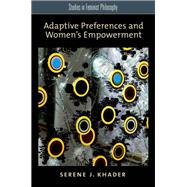Adaptive Preferences and Women's Empowerment
, by Khader, Serene J.- ISBN: 9780199777884 | 0199777888
- Cover: Hardcover
- Copyright: 9/8/2011
Women and other oppressed and deprived people sometimes collude with the forces that perpetuate injustice against them. Women's acceptance of their lesser claim on household resources like food, their positive attitudes toward clitoridectemy and infibulations, their acquiescence to violence at the hands of their husbands, and their sometimes fatalistic attitudes toward their own poverty or suffering are all examples of "adaptive preferences," wherein women participate in their own deprivation. Adaptive Preferences and Women's Empowermentoffers a definition of adaptive preference and a moral framework for responding to adaptive preferences in development practice. Khader defines adaptive preferences as deficits in the capacity to lead a flourishing human life that are causally related to deprivation and argues that public institutions should conduct deliberative interventions to transform the adaptive preferences of deprived people. She insists that people with adaptive preferences can experience value distortion, but she explains how this fact does not undermine those people's claim to participate in designing development interventions that determine the course of their lives. Khader claims that adaptive preference identification requires a commitment to moral universalism, but this commitment need not be incompatible with a respect for culturally variant conceptions of the good. She illustrates her arguments with examples from real-world development practice. Khader's deliberative perfectionist approach moves us beyond apparent impasses in the debates about internalized oppression and autonomous agency, relativism and universalism, and feminism and multiculturalism.






